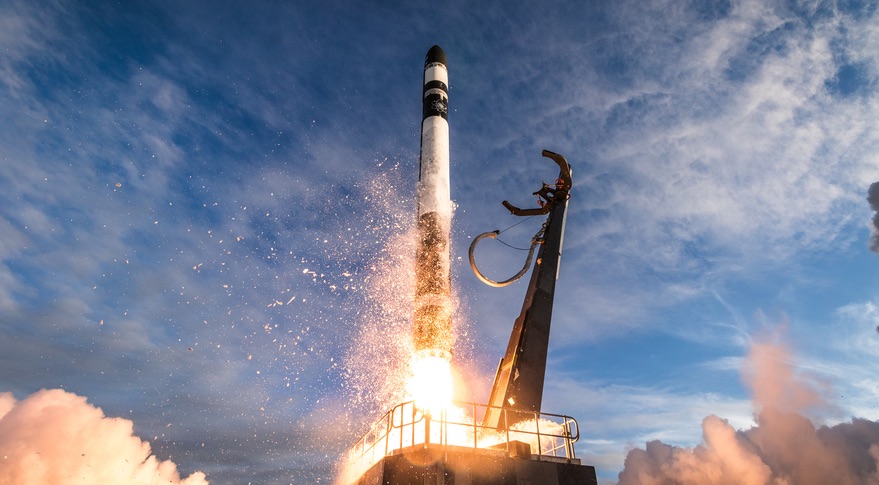Vector Aims To Be One of Two DoD Small Launch Firms
Posted on

Vector Launch is using a so-called ‘transporter erector launcher’ to put small payloads in LEO
SATELLITE 2019: The Defense Department’s national security launch needs likely will support only two of the some 150 companies now seeking to enter the small launch vehicle market, competitors say.
It seems like a new company enters the small launch vehicle race everyday, but industry officials agree only a few — perhaps as many as eight but quite possibly only four — will survive the general competition, let alone meet the more demanding requirements of the Pentagon. Rather than the US government being the ‘anchor client’ as has been traditional in space launch, commercial sales are driving the market now, a panel of small launch vehicle industry officials at Satellite 2019 agreed today. As for the national security market, it is likely to follow the model already set by DoD for heavy launch: two prime contractors to provide a modicum of competition and assured space access.
Robert Cleave, chief revenue officer for Vector Launch Inc., fully expects his company to be one of the winners in the national security market. In an interview Monday evening, he says Vector “will be at the right price point for the risk.”
Vector was one of the three companies chosen by the Defense Advanced Research Projects Agency (DARPA) in its Launch Challenge to rapidly launch small satellites to Low Earth Orbit (LEO). The other two winners in the first round of the competition for an ultimate prize of $10 million were Virgin Orbit, and a “stealth” company.
Cleave told me that while “dollars per kilogram” is one way to measure marketability for a launcher, there is also the factor of “time value for money.” So whereas today’s ride share providers — such as India’s popular Polar Satellite Launch Vehicle — have an advantage in cost per kilogram, they have disadvantages of not being able to provide customers with either bespoke launch dates or orbital injection into specific location.
For DoD and NASA, the latter is an important factor, he explained. “For the US government, it’s all about mission date certainty,” he said. Further, he pointed out that one of the considerations for national security launch is resiliency, and being able to launch from non-traditional space ports represents a form of resiliency.
Indeed, he explained that DARPA was looking specifically for companies that could provide “mobility in their operations — all three of us chosen are using mobile space ports.” “Think about … how you would deny (space) access to this country.,” he said. “You’d deny it by taking out Vandenberg or Cape Canaveral.”
Vector is using a “transporter erector launcher (TEL)” to, in essence, provide a mobile spaceport for traditional horizontal launch, Cleave said. Vector has two launch vehicles: the Vector R with a maximum payload of 60 kilograms, and the Vector H with a max payload of 290 kilograms.
Virgin Orbit, by contrast, is using a vertical launch vehicle (i.e. an airplane that launches a rocket) from a runway; there is no public information available about the “stealth” firm’s operations.

Rocketlab Electron launch on Dec. 16, 2018
Currently, the leader in small launch for DoD is Rocket Lab, based in New Zealand. Just three days ago, the company launched three small research and development payloads for the Air Force on its Electron vehicle, only five weeks after its previous launch. The so-called STP-27RD mission is in support of the DoD Space Test Program managed by Air Force Space Command’s Space and Missile Systems Center (SMC) in partnership with the Defense Innovation Unit as part of its Rapid Agile Launch Initiative. The Electron usually has a maximum payload of about 150 kilograms.
However, Cleave and other industry officials today said it is not a given that Rocket Lab will be one of the survivors.
Les Kovacs, the vice president of business development for Firefly Aerospace, explained today that “things always gravitate to larger vehicles” — a sentiment the others on the panel echoed. Firefly’s Alpha launch vehicle has a maximum payload of 1,000 kilograms. The company, which went bankrupt in 2016 but is now back in the game thanks to an infusion of cash from Ukrainian entrepreneur Max Polyakov, also has started a new unit called Firefly Black to sell its services to the US national security launch community, Kovacs said.
Cleave believes there will be room for more small launch vehicle companies than one might think, as different customers have different priorities and companies are seeking to serve different niche markets. “There will be a need for a lot of different vehicle types,” he said.
Subscribe to our newsletter
Promotions, new products and sales. Directly to your inbox.
